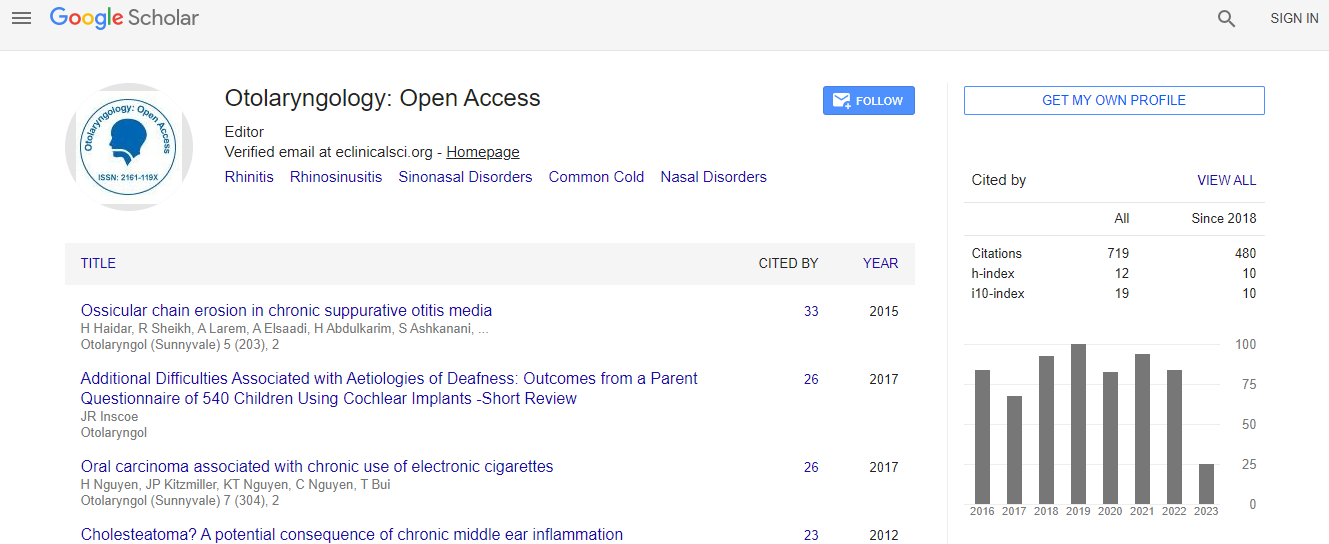Our Group organises 3000+ Global Conferenceseries Events every year across USA, Europe & Asia with support from 1000 more scientific Societies and Publishes 700+ Open Access Journals which contains over 50000 eminent personalities, reputed scientists as editorial board members.
Open Access Journals gaining more Readers and Citations
700 Journals and 15,000,000 Readers Each Journal is getting 25,000+ Readers
Google Scholar citation report
Citations : 925
Otolaryngology: Open Access received 925 citations as per Google Scholar report
Otolaryngology: Open Access peer review process verified at publons
Indexed In
- Index Copernicus
- Google Scholar
- Sherpa Romeo
- Open J Gate
- Genamics JournalSeek
- RefSeek
- Hamdard University
- EBSCO A-Z
- OCLC- WorldCat
- Publons
- Geneva Foundation for Medical Education and Research
- ICMJE
Useful Links
Recommended Journals
Related Subjects
Share This Page
Specific language impairment and auditory processing disorder: Insights from speech-ABR
3rd International Conference and Exhibition on Rhinology & Otology
Debora Maria Befi-Lopes, Caroline Rocha-Muniz and Eliane Schochat
University of Sao Paulo, Brazil
ScientificTracks Abstracts: Otolaryngology
Abstract
To evaluate neural mechanisms encoding speech sounds through Speech-ABR in APD and SLI children. Specifically, literature describes temporal processing abnormalities in SLI, so we hypothesized that SLI and APD would demonstrate greater perceptual deficits in neural encoding of speech sounds in subcortical auditory pathways in response to rapidly speech. Speech-ABR was tested in 57 children, 6-12 years old (three groups), TD (n=18; mean 109, 83 months), APD (n=18; mean 110, 00 months) and SLI (n=21; mean 96, 00 months). All children presented normal peripheral hearing bilaterally. Speech-ABRs were elicited using fiveformant syllable/da/(BioMARK). Based on these characteristics of Speech-ABR response, 3 dimensions were defined for analysis: Timing, harmonics and pitch. ANOVA test was applied (significance level 0.05). Timing of onset response to /da/ showed statistical differences between groups with APD and SLI, showing greater latency of ��?A� peak than TD (p=0.009 and p=0.002, respectively). For C, E, F and O peaks, only SLI group showed a statistically significantly increase in latency when compared to TD [E, O=p<0.05; C, F=p<0.01]. Furthermore, we observed discrete latency increase for SLI when compared to APD group with difference for E and F peaks [p<0.05]. For pitch and harmonic encoding, there were no group differences in amplitude of spectral component F0 and F1. In contrast, there was difference in encoding of HF among the response to TD and SLI (p=0.01) as well as APD and SLI (p=0.05). TD and APD exhibited greater amplitudes when compared with SLI. We concluded abnormal encoding for specific acoustic features that are characteristic of speech for children with APD and SLI. The hypothesize that abnormal speech-ABR should manifest itself in difficulties in speech perception was confirmed. However, SLI exhibited worst results when compared with APD and TD suggesting worst representation of crucial components of speech sounds could contribute to difficulties.Biography
Debora Maria Befi-Lopes is a Speech, Language and Hearing Therapist. She has completed her under graduation course at the Catholic University of São Paulo, Brazil, in 1979. She has earned PhD in Linguistics from the University of São Paulo (1997). She is an Associate Professor at the School of Medicine, University of São Paulo, Brazil, since 2002. She has published 98 papers in indexed journals and 284 abstracts in conference proceedings. She has published book chapters and books and received 39 awards and honors.
Email: dmblopes@usp.br

 Spanish
Spanish  Chinese
Chinese  Russian
Russian  German
German  French
French  Japanese
Japanese  Portuguese
Portuguese  Hindi
Hindi 
